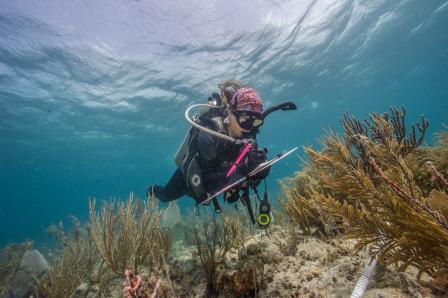Meet EPA Coral Scientist Cheryl Hankins
 EPA coral scientist Cheryl Hankins in St. John, U.S. Virgin Islands, conducting a coral demographic survey in which coral species are identified and measured. EPA coral scientist Cheryl Hankins investigates how land-based stressors such as plastic pollution and excess nutrients impact coral growth. Her research helps to establish threshold values within reef habitats that may inform better management practices.
EPA coral scientist Cheryl Hankins in St. John, U.S. Virgin Islands, conducting a coral demographic survey in which coral species are identified and measured. EPA coral scientist Cheryl Hankins investigates how land-based stressors such as plastic pollution and excess nutrients impact coral growth. Her research helps to establish threshold values within reef habitats that may inform better management practices.
When did you first know you wanted to be a scientist?
Around 8 years old, I wanted to be either an astronaut or a bus driver. At the time, McDonald’s was offering free meals to all bus drivers. When that offered expired, it was down to astronaut. My grandparents lived at the beach and we visited every year. By the time I graduated high school, my astronaut dreams shifted to marine biology.
What do you like most about your research?
Research is like a puzzle, you start with some facts. Through experimentation, you try to put these facts together to understand the broader picture. Coral are extremely hardy in some respects but especially sensitive in other areas (such as water quality). I am grateful that I get to work with these amazing animals to better understand their sensitivities and threshold values.
How does your science matter?
Our science matters because we are helping to inform policy and management decisions that will help with saving, and hopefully one day sustaining, our fragile coral reef ecosystems.
Tell us about your background.
I have a MSc in Biology. While working on my master’s, I was a Student Services Contractor working in EPA’s Coral Research Lab. My master’s thesis looked at nutrient supplementation in bleached mangrove jellyfish. These jellyfish harbor the same symbionts as coral; they can also bleach as coral do when they lose their zooxanthellae, making them more sensitive to environmental stressors.
If you weren’t a scientist, what would you be doing?
I would be in the Coast Guard. I come from a military family. Although no members of my family have been in the Coast Guard, my love of the water would have steered me in that direction. Nearly did, as I did meet with a recruiter.
What advice would you give a student interested in a career in science?
My advice is not specific to science however, I strongly recommend “sticking to your guns.” There will be so many times of frustration and disappointments, don’t give up! Everybody hits road bumps. There will be hard decisions that you will have to face, but if you are focused on a goal it will help with making those decisions.
If you can have any superpower, what would you choose?
My astronaut dreams never really went away, I’d love to be able to fly.
What do you think the coolest scientific discovery was and why?
That the Earth is round. It paved the way to so many other discoveries and explanations of our natural world. Besides, could you imagine what would happen when you finally reached the end of the road of a flat Earth?
Editor's Note: The opinions expressed herein are those of the researcher alone. EPA does not endorse the opinions or positions expressed.
